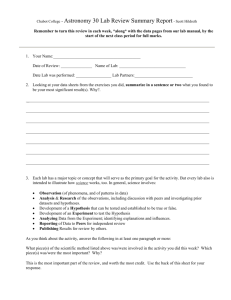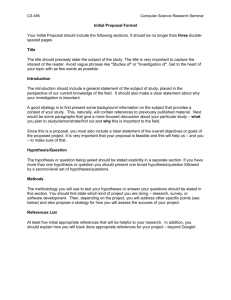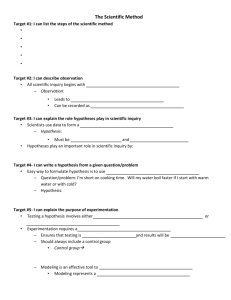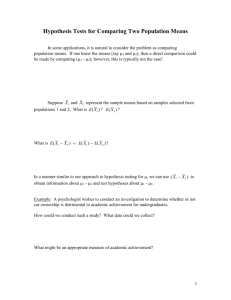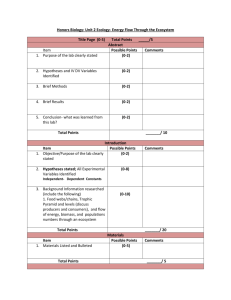AP BIOLOGY - Ms. Sastry
advertisement
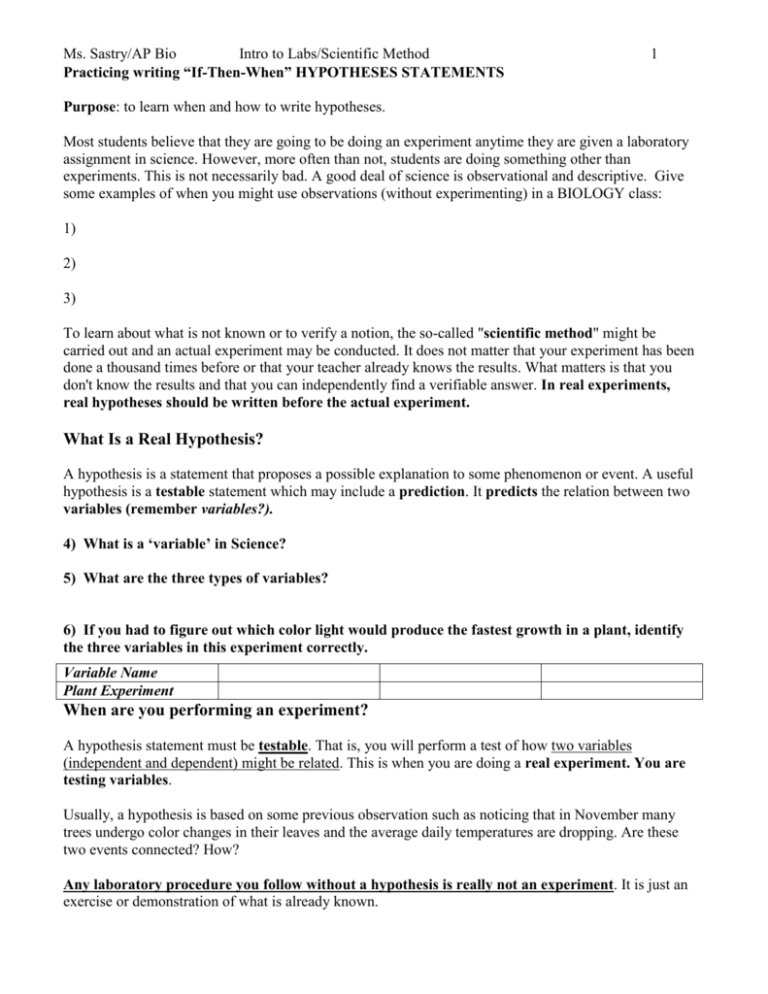
Ms. Sastry/AP Bio Intro to Labs/Scientific Method Practicing writing “If-Then-When” HYPOTHESES STATEMENTS 1 Purpose: to learn when and how to write hypotheses. Most students believe that they are going to be doing an experiment anytime they are given a laboratory assignment in science. However, more often than not, students are doing something other than experiments. This is not necessarily bad. A good deal of science is observational and descriptive. Give some examples of when you might use observations (without experimenting) in a BIOLOGY class: 1) 2) 3) To learn about what is not known or to verify a notion, the so-called "scientific method" might be carried out and an actual experiment may be conducted. It does not matter that your experiment has been done a thousand times before or that your teacher already knows the results. What matters is that you don't know the results and that you can independently find a verifiable answer. In real experiments, real hypotheses should be written before the actual experiment. What Is a Real Hypothesis? A hypothesis is a statement that proposes a possible explanation to some phenomenon or event. A useful hypothesis is a testable statement which may include a prediction. It predicts the relation between two variables (remember variables?). 4) What is a ‘variable’ in Science? 5) What are the three types of variables? 6) If you had to figure out which color light would produce the fastest growth in a plant, identify the three variables in this experiment correctly. Variable Name Plant Experiment When are you performing an experiment? A hypothesis statement must be testable. That is, you will perform a test of how two variables (independent and dependent) might be related. This is when you are doing a real experiment. You are testing variables. Usually, a hypothesis is based on some previous observation such as noticing that in November many trees undergo color changes in their leaves and the average daily temperatures are dropping. Are these two events connected? How? Any laboratory procedure you follow without a hypothesis is really not an experiment. It is just an exercise or demonstration of what is already known. Ms. Sastry/AP Bio Intro to Labs/Scientific Method 2 How Are Hypotheses Written? 1. 2. 3. 4. 5. 6. Chocolate may cause pimples. Acid in soil may affect plant growth. Watching TV leads to bad grades. Bacterial growth may be affected by temperature. Ultra violet light may cause skin cancer. Temperature shift may cause leaves to change color. All of these are examples of hypotheses because they use the word "may." However, their form is not particularly useful. Using the word may does not suggest how you would go about proving it. Good Construction of Hypotheses – ‘IF THEN WHEN’ STATEMENT: If skin cancer is related to ultraviolet light exposure, then people will show a greater risk of developing skin cancer when they are exposed to increasing amounts of Ultra Violet light If pea plant growth depends upon duration of daylight, then pea plants will show an increase in stem length when they are exposed to increasing amounts of light Notice that these statements contain the words if - then -when. They are necessary in a good hypothesis. But not all if-then statements are hypotheses. For example, "If I play the lottery, then I will get rich." 7) This statement - If I play the lottery, then I will get rich - is a simple prediction and not a hypothesis. Why? 8) Ultraviolet light causes skin cancer – is this a good hypothesis? Why/why not? Good hypotheses contain two variables. One is "independent" and the other is "dependent." The independent variable is the one you, the "scientist" control and the dependent variable is the one that you observe and/or measure the results. General format for if-then-when statements: Identify the two variables first. If (dependent variable) – *relationship words – (independent variable); Then – *trend indicator followed by dependent variable When – *trend indicator followed by independent variable *Relationship words – depends upon, results from, affected by, …. *Trend indicators - increasing/decreasing, greater/less, larger/smaller,…. 9) The ultimate value of a hypothesis is: Assignments: A) Rewrite these hypotheses using the if –then- when style shown. Identify the 3 variables, Control and Experimental setups for each. 1. Chocolate may cause pimples. Hypothesis (if-then-when format): Ms. Sastry/AP Bio 3 Variables: (Controlled- 3) Control setup: Intro to Labs/Scientific Method (Indep) 3 (dep) Experimental Setups: 2. Acid in soil may affect plant growth. 3. Watching TV leads to bad grades. 4. Bacterial growth may be affected by temperature. 5. Temperature shift may cause leaves to change color. B) When you are done, write 2 original hypotheses of your own using this form. Remember a hypothesis must be testable! C) Write a hypothesis statement for each of these questions – 1) Does temperature affect the performance of a track athlete in a 100 m race in Beijing? 2) Does spending more time on Homework increase your chances of getting an ‘A’ in AP Biology? 3) Does drinking red Bull improve performance on A tests?

